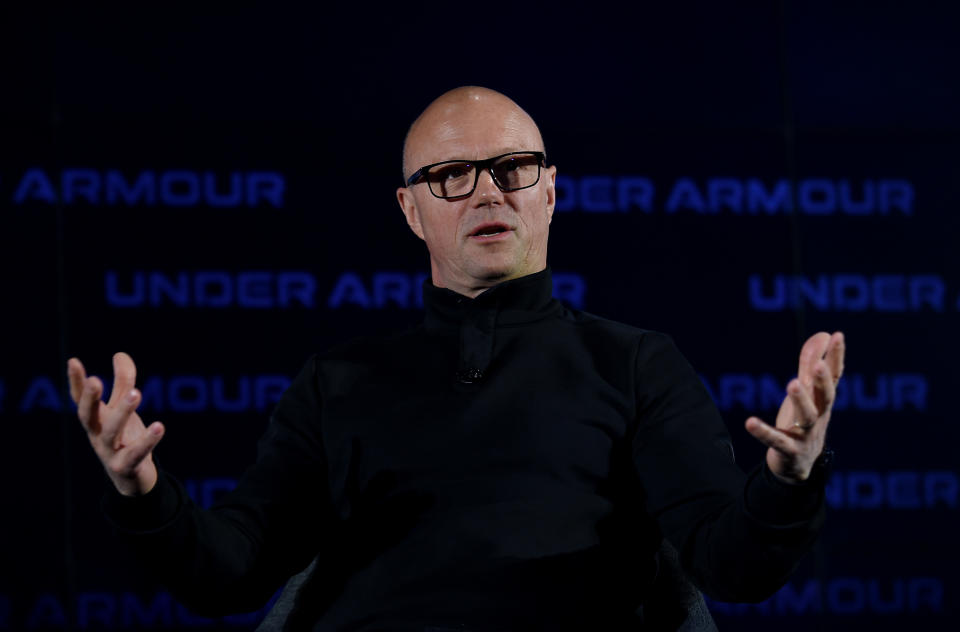Under Armour has a chance to radically shift its strategy out of coronavirus—but will it?
Under Armour has been hammered by the coronavirus shutdown.
The Baltimore-based sports apparel company reported its 2020 Q1 earnings on Monday, and the numbers are ugly. Revenue came in at $930.2 million, and loss per share was $1.30 (34 cents adjusted for restructuring costs), both numbers well below Wall Street expectations. The stock fell as much as 10% after earnings.
These key category stats are even more striking: overall sales fell 23% in the quarter (Under Armour believes 65% of that decline can be blamed on coronavirus); North America sales fell 28%; apparel revenue fell 23%; footwear revenue fell 28%; accessories revenue fell 17%.
This was the sixth consecutive quarter that Under Armour (UAA) sales declined in North America, its home turf. Meanwhile, its international business, a recent silver lining especially in Asia, fell 12% overall. Within the international segment, sales grew 3% in EMEA (Europe, Middle East, and Africa) but fell 34% in Asia.
Another key figure for Under Armour is inventory, which rose 7%, meaning that Under Armour is sitting on unsold goods. The company has had issues with inventory management in the past.
So, is anything okay at this company? And what can Under Armour do to get healthier?
Simeon Sigel, a retail analyst at BMO Capital Markets, has an idea: shrink to get stronger.

Amid coronavirus, the urgent priority of retail businesses is to focus on survival, of course. But the stronger businesses, like Nike, can go from defense to offense sooner, Siegel says.
For Under Armour, once U.S. stores reopen after coronavirus, “There may be an opportunity to pull back and become smaller and healthier by essentially using a COVID-19 cover,” Siegel says. “I think they were just too big. The reality is the company could have seen better profits on a smaller sales base. They could walk out of this and say we’re actually not going to try to reinvigorate growth, this is the right level of sales volume, now we focus on profits.”
Shrinking inventory would also allow Under Armour to raise prices and try to become a premium, full-price brand, something cofounder Kevin Plank specifically said was his goal back in 2017. It has not done that. (Another big problem for the brand in the last few years has been too much discounting.) As NPD Group analyst Matt Powell said at that time, “It’s not a matter of telling retailers you can’t price-promote, it’s controlling your inventory at a point where they don’t need to promote.”
Of course, it’s difficult for a publicly traded company to tell shareholders it is going to shrink its sales volume. It doesn’t happen often, though Siegel cites Ralph Lauren and Coach as brands that pulled it off in the past few years. But Under Armour can use coronavirus as the excuse, especially since 2020 is looking like a reset year for everyone in retail (aside from those declaring bankruptcy). As Siegel says, “If every company takes COVID-19 and just tries to get through it, all we’re going to end up with on the other end is the same damaged retail business, with a few fewer department stores.”
But there’s another hurdle standing in the way of Under Armour shrinking itself: the strategy is likely antithetical to cofounder Kevin Plank’s philosophy. Patrik Frisk, formerly of Aldo, took over as CEO in January, but Plank, now chairman of the board, is still seen by many as the man steering the ship at Under Armour, much like Bob Iger at Disney. (Under Armour’s press release last October announcing Frisk as CEO said he will “report to Kevin Plank.”)
To be clear, Under Armour has given no indication it will shrink its sales volume as a strategy toward profitability. The move may be unlikely. But as sales continue to decline in many key areas—indicating that the brand just isn’t resonating like it once did—something needs to change.
—
Daniel Roberts is an editor-at-large at Yahoo Finance. Follow him on Twitter at @readDanwrite.
Read more on how coronavirus is hitting the sports world:
Fanatics sees core parts of its business fall 100% with sports on hold due to coronavirus
Nike, Under Armour, Fanatics and other sports retailers are making coronavirus masks
Nike, Lululemon say they learned lessons from coronavirus closures in China they can apply to U.S.
Coronavirus hits sports leagues: March Madness canceled; NBA, NHL, MLS seasons on hold
